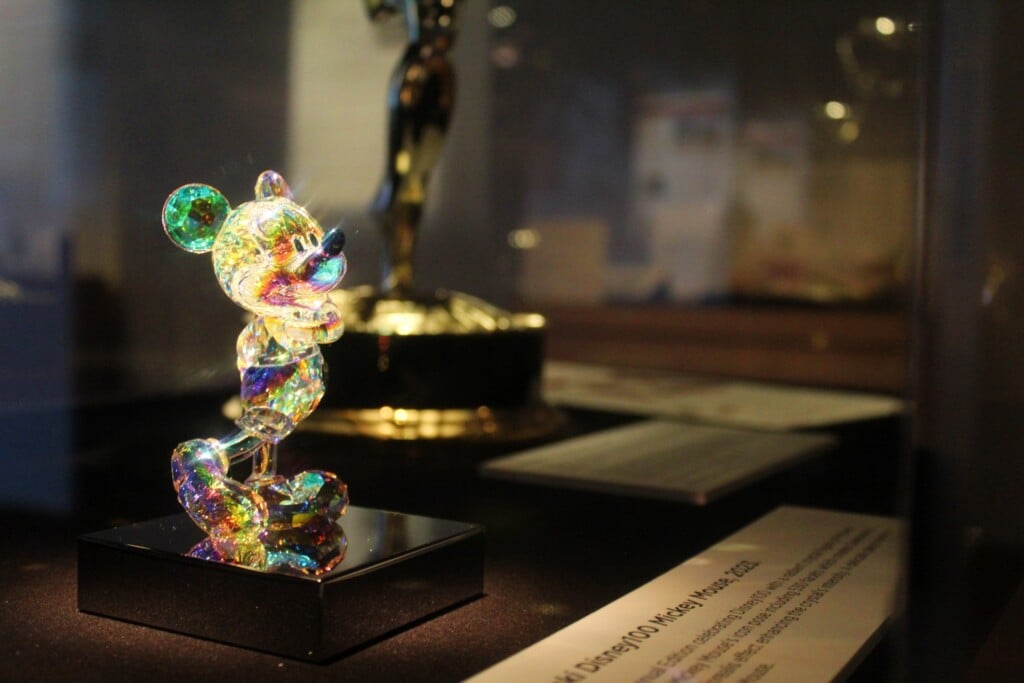At the Barn Players, Tim Cormack and a Stage Full of Black-Clad Women Rate a Complex Nine.
At first, before the music swelled up, a fountain started trickling and 20-odd women in elegant black paraded onto the set, I had doubts. Could this shebang really come off? After all, here’s the long-coming area premiere of Nine, a complex, operatic and mostly plotless musical from Maury Yeston and Arthur Kopit. The score is demanding, the themes complex, the source material — Fellini’s 8 ½ — storied and difficult. Even on Broadway, Nine had a hard time making audiences care for filmmaker Guido Contini, the man who has everyone. How would it fare as a community theater’s follow-up to You’re a Good Man, Charlie Brown? How inauspicious was the fact that the set, meant to suggest an exclusive Italian spa, with its chintzy gleam and wide expanse of faux-marble tiling, recalled nothing so much as the halls of Metcalf South?
Like Fellini’s classic, Nine details a great director’s great crackup, charting not only his failure to come up with a script worth shooting but also his attempts to free himself from a host of earthly dilemmas. He’s pinned between art and commerce, between church and sin, between wife and mistress, between mistress and mistress. For most of the show, the stage teems with women in orbit around Guido. Some he romances. Some he casts. Some finance his films. Most spill from one category into others. His mother (Melinda Whitman, singing with radiant power) is there, as is his favorite mistress (Vanessa Harper, done up in Priscilla’s wear so revealing, I hoped her mother wasn’t in the house).
What we know of them, we know only from Guido. They exist only as they do to him, as muses and sirens, as irritants and sources of guilt, most of them idling onstage, waiting for their chances to come down and matter for a moment. Sometimes he sits at the side of the stage and watches them sing about him; sometimes, in the most stirring choral passages, he struts among them, waving a baton, conducting his own singing harem (as musical director Kirk Carson conducts his own fine ensemble 15 feet to Guido’s right).
This is tricky material. It’s a hard-eyed look at male narcissism, but it’s also a musical, with torch songs, showstoppers and some stabs at real feeling. It’s also a dialect comedy, with overwrought, multilingual bickering and Germans right out of the Marienplatz glockenspiel. And it’s a sober-minded investigation of how life and art overlap as well as a romantic evocation of postwar, black-and-white Italy.
There’s so much going on here — with little actually happening storywise — that 30 minutes passed before I realized: Yes, they’re pulling this off. Once the melodies were sweeping over me, the relationships had become clear. And as Guido’s life began unraveling, I stopped fretting that there was little dramatic urgency to all of this. I just wanted the next song — even if there was a one-in-four chance I’d catch the singer eyeing Carson for the cue.
The ensemble singing is excellent, but the highlights all come from soloists. As Guido, Tim Cormack always looks a little too thrilled to be surrounded by so much female flesh — isn’t the point that he’s tired of this? But he attacks his numbers with clarity and muscle, lifting existential pain into beauty but never indulging in overstatement.
In just one number, Melissa Anderson generates excitement enough for a full show. Cutting loose in the risqué “Ti Voglio Bene/Be Italian,” she lets a 9-year-old feel her up, gets it on with a tambourine and inspires the entire house to clap along with just a couple stomps of her foot. She can sing, too.
Anderson is matched by Laura Jacobs, who gets a better song and a bigger part. As Le Fleur, Guido’s Parisian producer, Jacobs is all legs and shades, with her hair cinched in a severe bun and her face rigid with Francophone distaste for everything around her. She concocts an accent as thick as bad béchamel, but she’s so inventive and charismatic a performer that she triumphs with it. She’s funny all along, but her moment comes with “Folies Bergeres,” which finds her imperious character shedding inhibitions and costume in tribute to French burlesque. After some capital growls, thrusts and patter, she stalks down from the stage and into the crowd, sliding up next to men for some inspired improvisations. Usually in Kansas City, this kind of thing just makes everyone uncomfortable, but Jacobs is as quick-thinking as she is commanding, turning the awkward reactions into memorable comedy.
Unfortunately, the second act suffers from lost momentum. Much of it concerns Guido’s wife (Jennifer Scofield), whose blood never seems to burn as hot as it should. The finale hits 15 minutes too late, and by then, we’ve suffered a couple of Super Mario accents and one too many scenes of all the women filing slowly onto the stage.
Aside from those caveats, director Nino Casisi has achieved something remarkable. It’s been years since I’ve seen community-theater actors so thoroughly transformed into something worlds away from their own lives. That stage, graced by these women (in Renee Purtee’s smashing costumes), becomes the spa they say it is.




